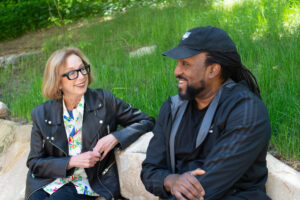Joseph Beyer
Mozilla and Sundance Institute have something in common—it’s surprising to a lot of people to find out that they are both non-profit organizations. Their missions are unified by joint passions for independent and open-source culture.
We invited Mozilla guru Ben Moskowitz to come to “The Mountain” and talk all things #transmedia with our lab fellows for the first New Frontier Story gathering at the Sundance Resort in Utah. Yesterday, he held an open forum keynote to demo some of Mozilla’s latest web-native tools sparking new ways of telling stories online.
“I’m Ben, I’m from Mozilla, and I’m here to tell you that technology has a huge role in the craft of future storytelling …” he opened. “Mozilla is a non-profit social enterprise. We make tools for the Web that anyone can use and improve. We use open-source code and collective intelligence to create exciting new layers to online experiences. We also make the awesome browser Firefox,” he added to quiet cheers from various self-declared geeks in the room.
“Video on the web has not really changed much, it has super limited context, it acts like a TV, a kind of closed black-box. We think there are new web behaviors that make it much richer and more engaging …” he continued. The lights dimmed and he shared his first example, the Israeli musician Yoni Bloch and his latest story experiment. Bloch is also the founder and CEO of Interlude, a technology startup developing interactive video technology that turns passive, linear videos into user-directed, multi-path stories.
“We want the creative communities to look at the web browser as a canvas you can paint on.” Moskowitz added. “That’s what web-native is. Web-Native is the collection of online tools you can mix and mash-up to create new interactive experiences on the web that are layered and sophisticated.”
“Think about film before sound design, or CG graphics or Non-Linear Editing … they’ve become essential parts of the craft of storytelling, and help creatives tell stories in new and emotionally engaging ways”. The web can directly impact power in story and narrative. It can become essential to the craft.”
The lights dimmed again and Moskowitz called on the crowd to conjure up one brave soul for an experiment, Conor McCreery from Canada bounded up and Moskowitz asked him to sign into www.takethislollipop.com with his Facebook account. The online experience began, both terrifying and hilarious at the same time.
The website is part of an emerging wave of “powered by profile” apps and experiences that customize themselves to you by passing through your social graph data and content. In short, the lines between film, games, text, and other storytelling forms are starting to blur.
The building block of this convergence is the web programming platform of HTML5. Mozilla is helping creators harness the power of HTML5 through a suite of new plugins and applications that create new online layers to websites. Bundled together, Mozilla calls the package “Popcorn.js” – the .js stands for the JavaScript Library of tools that make it up.
Moskowitz tried to make nerds of everyone in the room and broke it down, “Popcorn is a creative toolkit, think of it that way. Javascript is the engine of that toolkit, what makes it run. CSS (Cascading Style Sheets) is the styling and design language of that toolkit, what gives it the Look and the Feel.
Vibration sensors and gyroscopes within hardware and devices can now communicate with the web in new ways using the toolkit. Finally Popcorn – Popcorn is the connective tissue between these tools that tells them what to do. It makes web pages higher-fidelity, more advanced than you’d expect a website to be,” he explained.
Moskowitz got a big laugh we he pulled up a Fast Company article written hours before about Popcorn Technology (and referencing lab fellow Chris Milk, who was in the audience, taking note like everyone else).
“It’s advancing so quickly because of the founding principles we have behind it. It has to be High-Fidelity, it has to be Standardized so it’s easy to develop everywhere and it has to be Ubiquitous. Those things fuel our developer culture and create faster innovations …” Moskowitz went on. And because Popcorn is free and open source, it can be altered and improved by anyone anywhere.
One project at the New Frontier Lab exploring Popcorn is 18 Days in Egypt, which chronicles the first 18 days of the Egyptian revolution through the media (videos, photos, Tweets, Social-Posts, etc.) generated by those that were actually there. The creative team of Jigar Mehta and Yasmin Elayat worked with a grant to Mozilla’s team to try some ideas out for their project. They shared the results with the crowd at the Sundance Resort.
“18 Days in Egypt” experimented with time-mapping actions within their online video content, allowing users to explore video more like a story itself, integration and contextual overlays with Flickr Photo Feeds and Twitter conversation feeds, and finally editing real-time data within moving images as a kind of new B-roll. The team spent 15 hours with Mozilla code engineers to create the experiments.
Another element adding fuel to the fire is the rapid deployment of WebGL, a new web standard that extends the power of JavaScript and allows it to generate interactive 3D graphics within compatible web browsers. Moskowitz pointed to data showing almost 40% of web surfing takes place in browsers that are WebGL enabled. Chris Milk is among the artists currently playing in the WebGL sandbox and Mr. Doob is a programmer writing applications for WebGL.
Moskowitz ended his session by bringing the focus back to story and filmmaking, advising the content creators in the crowd to plan for using #transmedia in pre-production and build for capturing and creating the assets in advance.
“I think the indie film and indie creative communities no longer see this stuff as ‘weird’ or ‘fringe’ and that’s making the capacity for the field to grow real. We need real storytelling and real art to push this forward. You always have to start with the power of an engaging story or what you end up with just fails to connect with people on a deep level. These interactions are not a huge leap in user behavior, people will engage naturally.” You can follow Ben Moskowitz on Twitter here.




